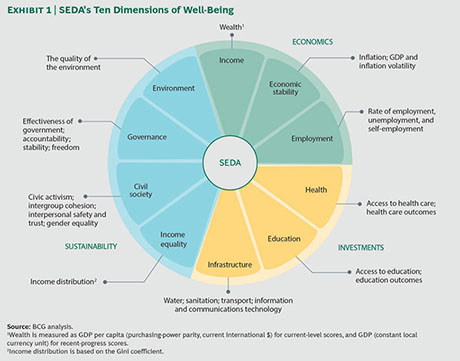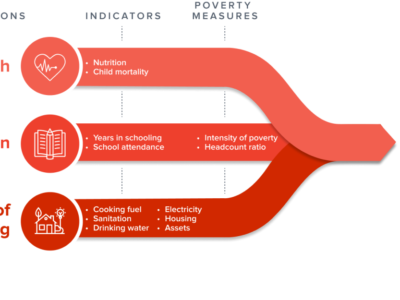Researchers at the Boston Consulting Group (BCG) have found an alternative to measure economic progress in countries. It is called the Sustainable Economic Development Assessment (SEDA). SEDA is an economic index that tracks 160 countries across three major elements: economics, sustainability and investment.
Leaders around the world increasingly recognize that Gross Domestic Product (GDP) alone cannot give a full picture of a country’s performance. The well-being of citizens is an even more important measure. Sustainable Economic Development Assessment (SEDA) is a powerful diagnostic designed to provide government leaders with a perspective on how effectively their countries convert wealth, as measured by income levels, into well-being. – The Boston Consulting Group
These major elements of the SEDA index are made up of 10 dimensions, which include factors such as income equality, health, education and infrastructure. By measuring how countries perform across all the 10 dimensions, the SEDA establishes which countries are managing – or in some cases failing – to use both their absolute wealth and their economic growth to improve the lives of their citizens.
Defining the Major Elements of the Sustainable Economic Development Assessment
The Economics includes income, economic stability, and employment. The Sustainability covers two areas: the environment dimension and social inclusion, which comprises the income equality, civil society, and governance dimensions. The Investments includes education, health, and infrastructure.

For each country, the BCG calculates four measures that provide insight into relative levels of well-being:
a. The current level offers a snapshot of well-being today on a scale of 0 (lowest) to 100 (highest).
b. Recent progress examines how well-being has evolved. This metric is also measured in relative terms, on a scale of 0 to 100.
c. Wealth to well-being compares a country’s current level of well-being with the level that would be expected given the nation’s per capita income. The expected level is represented by a coefficient of 1.0, which is based on global averages.
d. Growth to well-being compares how effectively a country has converted its economic growth into well-being improvements with the level that would be expected. This is also represented by a coefficient of 1.0, based on global averages.
How Does Nigeria Perform on the Sustainable Economic Development Assessment?
Nigeria boasts abundant assets — most notably, vast natural resources, arable land, and a young, entrepreneurial population.
On the basis of SEDA analysis of Nigeria and interviews with Nigerian executives in all key sectors of the economy, including energy, banking, consumer goods, and telecommunications, the BCG propose focused, market-oriented interventions in five critical areas: civil society, governance, infrastructure, education, and health. Infrastructure should be the top priority—weakness there limits progress in a number of other areas, including health and education.
The followings were recommended by the BCG.
1. Strengthening Governance and Civil Society
– Improve government regulations.
– Deploy digital technologies in government.
2. Infrastructure: Building the Foundation for Success
– Create a central body that is empowered to oversee the life cycle of infrastructure investments.
– Identify ten high-priority, high-impact projects.
– Conduct an international road show to line up private funding and establish public-private partnerships.
– Focus on flawless execution.
– Leverage momentum to create a sustained infrastructure-building drive.
3. Education: Bolstering the Workforce
– Establish a national curriculum and track results.
– Increase enrollment, bolster the teaching corps, and harness technology and private-sector innovation
– Build stronger connections between the education system and the job market.
Health: A Strategy for Leapfrogging
– Transform the health ecosystem, strengthen the primary health system, and expand health insurance coverage.
– Take steps to allow Nigeria to leapfrog in the development of the health system.
Addressing the current economic challenges in Nigeria and unleashing the energy and drive of its people will require action by the government—most notably in infrastructure, health, and education. Improvements in those areas will create sizable, positive ripple effects throughout the economy, including possibly a surge in foreign direct investment. Focused and sustained effort can yield real progress—and raise the well-being of all Nigerians.





